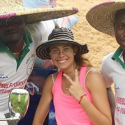Mapping of social entrepreneurs within their ecosystems in the field of food security

In Autumn 2016 a mapping will be conducted within the F&BKP that plots social entrepreneurs working in the field of food security within their ecosystems. Opportunities and challenges of those social enterprises with a focus on doing business with a social impact related to the context in which they work in seven Dutch partner countries will be analysed.
In a recent F&BKP literature review on social entrepreneurs as change makers for food security an outline has been given of the main opportunities, challenges and lessons learned of social entrepreneurs working on food security. Clear is that social entrepreneurship as a concept of doing business with a social mission has the potential to increase food and nutrition security by filling specific gaps where NGOs, governments and private entities are lacking to work on tackling food security. However, to create a good supporting ecosystem for social entrepreneurs, more insights are necessary on how and to what extent surrounding actors help social enterprises and how this could be improved. This is what this mapping project aims to do.
Interactive online mapping
SocietyWorks and self-employed knowledge broker Evert-jan Quak, in close collaboration with Impact Hub Amsterdam, together with other social entrepreneurship supporting organizations (start-up incubators, labs and hubs, accelerators) in the seven developing countries, will set up an interactive knowledge mapping process. So-called linking pins, key actors from social entrepreneurship supporting organizations in Kenya, Ethiopia, Bangladesh, South-Sudan, Indonesia, Benin and Ghana will collect specific data on 50 social entrepreneurs and their ecosystems via questionnaires and focus groups. Outcomes of the surveys will be openly accessible via a global online mapping tool. In addition more in depth information will be collected in the group exchanges on how social entrepreneurs have tried to tackle challenges in their business cases and how the supporting organizations, government entities, NGOs, businesses, donors and knowledge institutes were involved and/or could play a role in the future. After data collection and analyses, the linking pins per country will present their findings in an online session to the project working group in the Netherlands. Those outcomes will be jointly analysed and synthesized by this group in a concluding report including various infographics.
Policy recommendations and further action
Based on these joint country analyses, policy recommendations will be formulated for the social entrepreneurs, hubs, governments and other actors. This can stimulate them to create a better enabling environment for social entrepreneurs and put more emphasis on this topic on the policy agendas both in the Netherlands and in the local countries. This process will also encourage the entrepreneurs to strengthen their communities of practice and to learn cross-country-wise. Throughout the project links between and with these entrepreneurs will become more close and insight in the role and situation of the entrepreneurs will be deepened. By offering a larger picture on the situation of social enterprises in the seven countries and involving related stakeholders from the beginning, the project aims not only to support the entrepreneurs themselves, but also to stimulate policy makers, supportive hubs and labs and development institutions, in collaborating with social entrepreneurs in order to contribute in a profitable way to food security.
For questions and/or suggestions related to this project, please contact Knowledge Broker Vanessa Nigten ().
_ _ _
In February 2017, the synthesis report “Mapping of social entrepreneurs in food value chains within their supporting ecosystems” was published. Follow this link for the news item and to download the mapping.






